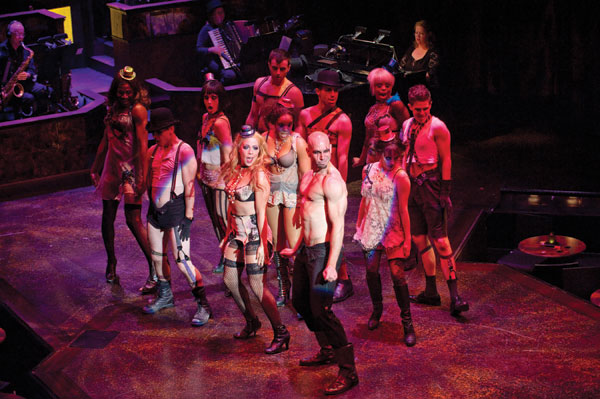A haunting, exhilarating, unforgettable ‘Cabaret’
ARNOLD WAYNE JONES | Life+Style Editor
jones@dallasvoice.com
CABARET
Wyly Theatre, 2400 Flora St. Through May 22. $10-$80.
DallasTheaterCenter.org
……………………………………..
It’s no exaggeration to say that Cabaret is the best thing the Dallas Theater Center has done since moving into its new digs at the Wyly Theatre almost two years ago. When they took over the space, artistic director Kevin Moriarty said it would take a few years before the artists working there fully assessed what the theater could be. With back-to-back stagings by Joel Ferrell — Dividing the Estate in March, now this — it’s clear that at least one artist has staked his claim on understanding that potential.
Ferrell’s decision to turn the floor of the theater into a nightclub — with cocktail service and café tables and the actors interacting with the audience as they might inside the Rose Room — both gives some attendees respite from the notoriously hard green chairs of the Wyly and a sense for the intimacy and humanity of a musical that, at its heart, is about sweeping ideas and man’s inhumanity.
It’s 1931 Berlin, and the Nazis are rising to power, but for the staff and patrons of the Kit Kat Klub, it’s hard to see that the party’s almost over. They should know it — in Clint Ramos’ tattered costumes, ghastly makeup and walking through Bob Lavallee’s skeletal set, everyone looks hung over and slightly diseased. (So intense is the sexual energy in the buoyant opening number, I had a strong desire to leave immediately and get tested for Chlamydia.)
Cliff Bradshaw (Lee Trull) is late to the party. A stand-in for the gay writer Christopher Isherwood, Cliff hopes the decadence of the city will inspire his next novel. He settles into a boarding house that’s a microcosm for the diversity of the city — and a hotbed of what will rip Germany apart.
Of course there’s Kander and Ebb’s potent score, but Ferrell’s direction is stand-out. His deftness with political subtext, foreshadowing the horrors of the Holocaust and conveying the allure of institutionalized hatred as a rallying point for a defeated and scared proletariat, echoes realities of our own politically divisive society with haunting poignancy. (Sally Vahle, who transforms from street whore to grande dame of the Fatherland, is the starkest metaphor for its appeal. It’s fun while it lasts; après-vous, le deluge.)
Wade McCollum dominates the cast as the Emcee. In red eyeliner, low-slung hip-huggers that barely conceal his junk and a demonic grin that creeps you out and seduces you at the same time, his characterization is equal parts Alice Cooper, Dr. Frank-N-Furter and Alex from A Clockwork Orange. Surrounded by his Droogs — the chorus boys, a raucous bunch of muscled hooligans — he presides over the festivities with a flirtatious recklessness (during the Nazi anthem “Tomorrow Belongs to Me,” he hyperventilates at the notion of watching the world end), he’s practically the raison-d’etre of the piece.
Practically, but not entirely — no one disappoints. As Sally Bowles, the headliner at the cabaret, Kate Wetherhead is physically delicate but convincingly flighty and self-destructive with a great performance style. Her delivery on “Maybe This Time” lingers. David Coffee and Julie Johnson as the middle-aged couple tentatively staking out a romance form the core of the play’s emotional life. Their doom resonates and the irony of the show’s most famous lyric — “Life is a cabaret, old chum — come to the cabaret” — leaves you breathless by the end.
This article appeared in the Dallas Voice print edition May 6, 2011.
To read an interview with the director and star, click here.
















